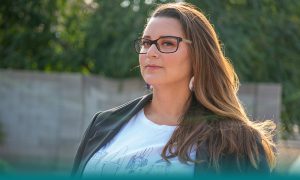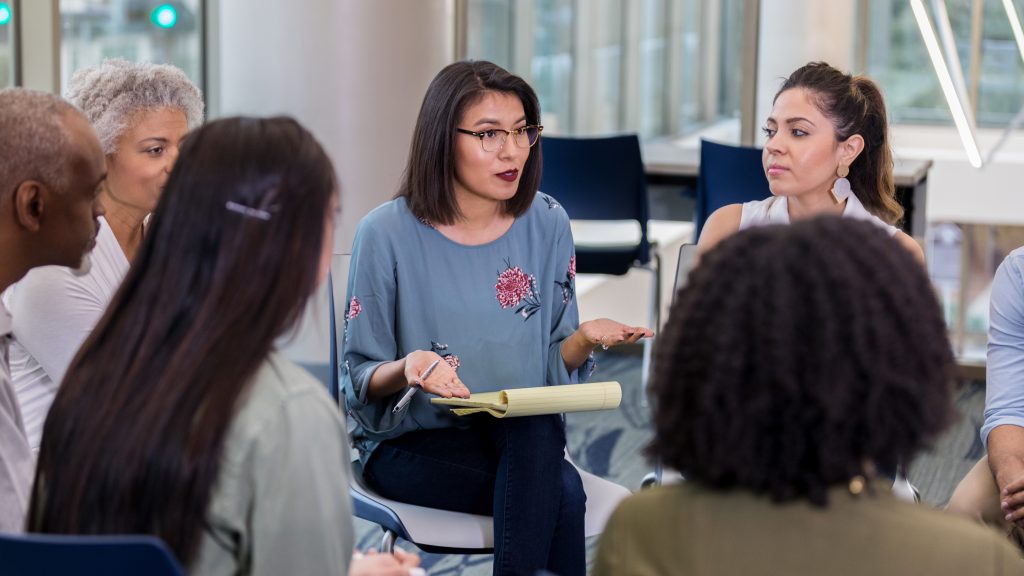
My name is Brittany Schulman, and I’m the Vice President of Indigenous Leadership & Educational Programs at Native Americans in Philanthropy. As an enrolled citizen of the Waccamaw Siouan Tribe, a traditional storyteller, and a results-driven educator, I’m committed to ensuring that Indigenous values are not only included but at the forefront in every conversation. Today, I want to show you how Indigenous values are essential for reshaping evaluation.
To say that we, as Indigenous peoples, are the first philanthropists implies that our societies worked similarly to that of our current capitalist system; that there was a need for mechanisms that kept the wealthy wealthy while supporting a charity mindset. Many of our civilizations and societies did not operate from this framework. We had different methods of redistribution, including what were known as giveaways, potlatches, and throws. Many of our ceremonies included processes of resource distribution. It was important and imperative to be a good relative.
This distinction — wealth as resource versus wealth as relationship — is key when trying to understand how our societies functioned. Indigenous peoples viewed wealth quite differently than Euro-American systems. Wealth was not the acquisition of resources, but something based on relationships. The measure of wealth was based on how many sisters, brothers, clan members, aunts, uncles, and cousins you had and how you interacted with all of them. Were you a good relative?
Part of being a good relative meant centering the relationship and the reciprocal responsibility that each relationship held. For example, many Indigenous communities refer to the Earth as Mother. If we are in good relationship with our Mother, we look after her needs, we listen to the lessons that are shared, and we shift our actions to be aligned with those needs and lessons. Similarly, when we are engaging in maintaining that balance, our Mother reciprocates, she provides the food that is needed, shelter and clothing that cover us, and she takes care of us.
Evaluation is one part of the reciprocal relationship with our community. As we are preparing our evaluative tools, we should begin with listening to the need and lessons from the communities we intend to evaluate, and we should align how we plan to use the learnings to shift our actions to support our communities. Evaluation should not be done in a vacuum but as part of the bigger ecosystem of interconnectedness.
Indigenizing evaluation means that we are good relatives and uphold our responsibility to our communities. Indigenizing the sector means that we tell the truth about the history of philanthropy and how the sector can do better to be good relatives to our communities.

Call to Action for Evaluators
- Listen- and seek to be a good relative by unlearning stereotypes and decolonizing structures within your organization that make funding Indigenous people difficult.
- Identify tangible steps you can take to decolonize your evaluations. Resources from the Indigenous Peoples in Evaluation TIG are a good place to start.
- Create a strategy that invests in Indigenous communities long-term. Philanthropy often operates with a short-term mindset instead of valuing the longer time horizons that relationships — and evaluations — require and deserve.
- For philanthropy, within every funding area that you have, there is a tribe and organizations doing that work. Fund them. Resources like NAP’s Tribal Nations Initiative and Native Voices Rising can help you build collaborative relationships with Indigenous organizations and direct more resources to them.
- While you are building relationships, fund intermediaries that are doing good work and supporting communities. Let this be a starting point and not a stopping point.
Do you have questions, concerns, kudos, or content to extend this aea365 contribution? Please add them in the comments section for this post on the aea365 webpage so that we may enrich our community of practice. Would you like to submit an aea365 Tip? Please send a note of interest to aea365@eval.org. aea365 is sponsored by the American Evaluation Association and provides a Tip-a-Day by and for evaluators.
